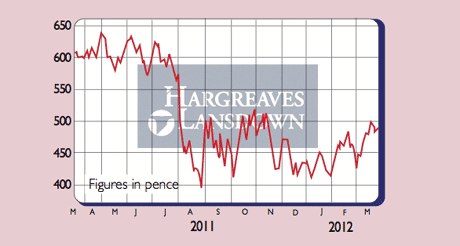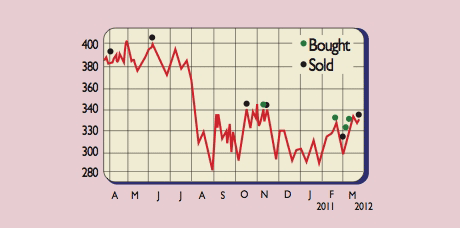Hargreaves Lansdown: A good firm under threat
Hargreaves Lansdown is a profitable business. But new regulations will bring fresh challenges to the finance firm. So should you buy its shares? Phil Oakley investigates.
Get the latest financial news, insights and expert analysis from our award-winning MoneyWeek team, to help you understand what really matters when it comes to your finances.
You are now subscribed
Your newsletter sign-up was successful
Want to add more newsletters?

Twice daily
MoneyWeek
Get the latest financial news, insights and expert analysis from our award-winning MoneyWeek team, to help you understand what really matters when it comes to your finances.

Four times a week
Look After My Bills
Sign up to our free money-saving newsletter, filled with the latest news and expert advice to help you find the best tips and deals for managing your bills. Start saving today!
Hargreaves Lansdown is a good business, but it's under threat from new regulations, says Phil Oakley.
The business
Hargreaves Lansdown (HL) is a listed independent financial services provider for retail customers. Its flagship product is Vantage, a platform that allows people to bring all their investments shares, funds, Isas and pensions into one wrapper. The aim is to make it easier for people to look after their investments and at the same time save them money on the costs of investing in more than 3,000 unit trusts.
It also provides financial advice and discretionary portfolio management, annuity and income drawdown products, along with traditional stockbroking services. In addition, it offers investment services to companies. In total, Hargreaves manages client assets of £23.4bn.
MoneyWeek
Subscribe to MoneyWeek today and get your first six magazine issues absolutely FREE

Sign up to Money Morning
Don't miss the latest investment and personal finances news, market analysis, plus money-saving tips with our free twice-daily newsletter
Don't miss the latest investment and personal finances news, market analysis, plus money-saving tips with our free twice-daily newsletter
The history
Peter Hargreaves and Stephen Lansdown formed Hargreaves Lansdown in 1981. The pair set themselves up in Peter Hargreaves' spare bedroom with a couple of borrowed desks and a built-in wardrobe as a stationery cupboard. Their initial business was providing advice on unit trusts and tax planning via a newsletter called The Unit Investor'.
In 1986, they started to offer personal investment management services to their clients. In 1991, Hargreaves Lansdown stockbrokers was formed and the company started to play a leading advisory role in government privatisations and company flotations.
The firm's retail customer base grew, thanks to the success of popular tax-efficient savings products, such as personal equity plans (Peps), combined with its ability to offer low costs and straightforward customer service. This growth continued with the introduction of stakeholder pensions, Isas and Sipps. In 2007, 25% of the firm was floated on the stockmarket and in 2011 it became a member of the FTSE 100 index.
The co-founder
The son of a Lancashire baker, Peter Hargreaves came from humble beginnings to create a business now worth in excess of £2bn. He started out as a chartered accountant but quickly realised that it wasn't the job for him. He went on to work for a computer company and then a brewery and picked up some valuable lessons about what makes good and bad businesses before starting Hargreaves.
He inherited his father's frugal ways and doesn't believe in borrowing money. In a competitive IFA market, the secret of the company's current success is disarmingly obvious: it tries to understand its customers' needs and keeps the resulting financial advice simple.
Should you buy the shares?
Hargreaves is a very profitable business. But can the good times continue? Tax sheltered products, such as Isas and Sipps, should remain popular, as should Hargreaves's low fees. The growth in DIY investing looks set to continue as more people seek to control their own financial destiny. This should help Hargreaves, which has proved itself to be a good source of research and advice for private investors. Its corporate pensions business also shows good growth potential as firms look to outsource their pension schemes.
However, the business also faces some challenges. Management fees are mainly based on the value of a customer's assets, so this income is somewhat dependent on the performance of volatile global markets. Another threat to all advisers is the government's Retail Distribution Review (RDR) of the investment industry.
Hargreave's financial advice business looks relatively immune, as it is already fee-based and employs well-qualified advisers. However, it remains exposed to a proposal to get rid of payments from fund managers to fund platforms for selling their funds. This income stream accounted for just over a third of the firm's revenue in 2011.
City analysts still expect profits to grow and for Hargreaves to pay out most of them in dividends. By itself the dividend yield is tempting, however the threat of the RDR makes us nervous. The shares are a hold' for now.
The numbers

Stockmarket code: HL
Share price: 487p
Market cap: £2.3bn
Net assets (Dec 2011): £116m
Net cash (Dec 2011): £112m
P/e (current year estimate): 20.6
Yield (prospective): 4.4%
What the analysts say
Buy: 7
Hold: 5
Sell: 0
Average price target: 540p
Director Shareholding

P Hargreaves: 152,717,606
S Lansdown: 95,500,000
T Taylor: 734,091
Get the latest financial news, insights and expert analysis from our award-winning MoneyWeek team, to help you understand what really matters when it comes to your finances.
Phil spent 13 years as an investment analyst for both stockbroking and fund management companies.
-
 Should you buy an active ETF?
Should you buy an active ETF?ETFs are often mischaracterised as passive products, but they can be a convenient way to add active management to your portfolio
-
 Power up your pension before 5 April – easy ways to save before the tax year end
Power up your pension before 5 April – easy ways to save before the tax year endWith the end of the tax year looming, pension savers currently have a window to review and maximise what’s going into their retirement funds – we look at how